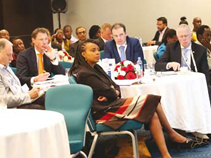 The second edition of the Flower Logistics Africa (FLA) and Perishable Logistics Africa (PLA) was held on the 22nd and 23rd November consecutively at the Radisson Blu Hotel in Nairobi. The event was organised by various stakeholders and went on successfully for the two days. The occasion brought together key industry players including growers, exporters, freight forwarders, the airlines etc.
The second edition of the Flower Logistics Africa (FLA) and Perishable Logistics Africa (PLA) was held on the 22nd and 23rd November consecutively at the Radisson Blu Hotel in Nairobi. The event was organised by various stakeholders and went on successfully for the two days. The occasion brought together key industry players including growers, exporters, freight forwarders, the airlines etc.
The conference was structured in to panel discussions where various panellists handled different topics as the audience actively participated in the discussions. The discussions on Flower logistics revolved on the theme: ‘Enhancing Africa’s flower power through better logistics’ and highlighted issues on technology trends in cool chain management, standards in packaging of flowers etc. while for the perishables was ‘Creating Africa’s future logistics grid for perishables’ and covered topics on industry collaboration, better logistics leads to profitability and reduces wastage, temperature management as well as transparency in transport from farm to fork. Logistics refers to the whole framework whether physical, technical or administrative for the transportation of perishables.
Logistics start right away from the farm to the consumer of the product. Employing better logistics in the industry will definitely lead to profitability and reduce wastage.
The Kenya Flower Council Chief Executive Mrs. Jane Ngige said, “In order to achieve better logistics, information sharing is vital for the value chain to run smoothly hence a good communication strategy should be set to ensure that information is shared among all the actors involved”. She added that growers need to take responsibility to ensure they understand the value chain. Again, there should be implementation of standards. It is important to make ensure that after setting the standards, they are followed to the latter. Taking up responsibility by each of the actors in the value chain is importantmas it enables them to perform their duties diligently.
Moreover, Government involvement and participation in the industry will ensure that better logistics are attained. For example, the government should integrate associations to enable farmers to access information easily. Capacity building is yet another factor that aims at achieving better logistics through offering training services to players along the value chain.
Technology is the hallmark in ensuring that better logistics are attained. For Instance, creating the traceability system will help a big deal in ensuring that products can be traced right from the point of origin to the point of consumption. The Use of data loggers ensures that a good track of events is kept whereas the use of electronic programmes will greatly reduce paperwork.
“Processes need to be simplified, and technology will help in this. Effective regulations are required to keep the industry in check. But those should not be laborious ones,” said Susan Akwesi, manager, Saudia Cargo pointing towards one of the major concerns of the industry.
The industry is also looking to share data to bring in efficiency. Liege Airport’s cargo sales manager, Eric Gysen highlighted that the Liege airport on an experimental basis started sharing data with the flower value chain operators.
Communication systems should be digitalized so that the access to information is made easier for each of the players along the value chain. Temperature monitoring devices and cooling facilities should be set up at warehouses to sustain the quality of the products. Adoption of barcode reading technology enables the grower to know where the product needs to be stored, how efficiently it is distributed to the warehouse and to customers and to track each product that is sold. This helps in managing inventory information and concurrently increases both productivity and efficiency.

The industry too, should be at upfront to create better logistics. For instance, there has been harmonization of codes of practices in to one basket of standards. It should ensure that these standards are implemented.
Peter Musola, cargo commercial manager at Kenya Airways, pointed out “how collaboratively the stakeholders can work together to support and improve speed in flower trade.”
All were in agreement when the speakers called for a more collaborative approach from all stakeholders in the flower trade value chain that would be the way forward for the flower industry.
Stakeholders play a pivotal role in ensuring that better logistics for both flower and perishables is attained. For instance, there should be engagement with the interveners e.g. those who issue permits, those responsible for inspection services etc. The airlines should improve the speed of perishables to cut out the issues of delays that are currently being experienced. In Order to ensure that better logistics are attained, it is important for each player along the supply chain to ensure that the quality of product is maintained up to the final destination. All the processes right from the point of origin to the point of consumption should be seamless.
The panellists who steered the discussions included Jane Ngige –KFC CEO, Bernard Oosterom – AIPH, Christo van der Meer – Flora Holland, Guy Symondson – EA Cargolite, Elizabeth Kimani – Maasai Flowers, Chris Mclean- Panalpina Airflo, ; Eric Gysen – Liege Airport, Conaa D’souza- Veg Pro Group, Sarah Wangui- Network Airline Services, Eliud Njenga- Pigeon Blooms, Parith Shah- Silpack, Jeroen van get Hulst, Flower watch , Eddy Verbeek – Florensis, Wouter Boeke – Lufthansa Cargo, Dr. Isaac Macharia – Kephis, PeterMusola – Kenya Airways, David Onyango – Flamingo Horticulture, Gladys Maina- Dysa Consulting, amongst others.
